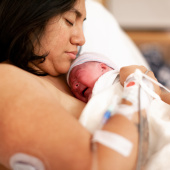Many infections during pregnancy can be treated with rest and self-care. However, some common infections can be more serious during pregnancy.
Read our guide on which infectious illnesses the pregnant woman or parent should be aware of, ways to reduce the risk of getting them and how they are treated.
Pregnant women and people may be more susceptible to being affected by infectious illnesses. However, an individual’s immune system may respond differently depending on the infection and the stage of pregnancy (Mor & Cardenas, 2010).
Coping with illness during pregnancy
Simple hygiene measures can reduce the spread of germs. These include:
- Washing hands regularly
- Catching sneezes with a tissue and throwing it away
When ill during pregnancy, it can soothe symptoms to:
- Rest at home if possible
- Drink plenty of fluids
- Eat if you feel you can
Chicken pox
Chicken pox is a very infectious illness which causes a fever and a rash. Most women and birthing parents (9 out of 10) are immune to chicken pox. This is because they have had it previously, usually in childhood, and their body has produced antibodies (RCOG, 2024a).
Because of this, getting chicken pox when pregnant is uncommon. Only 3 in 1000 people will get chicken pox, meaning 997 in 1000 won’t (RCOG, 2024a).
Getting chicken pox in pregnancy can lead to the mother or birthing person experiencing (RCOG, 2024a):
- chest infections (pneumonia)
- inflammation of the liver (hepatitis)
- inflammation of the brain (encephalitis)
Very rarely, it can lead to death.
What are the risks for the baby? (RCOG, 2024a)
There is no evidence of increased chance of miscarriage. However, the risks for the baby increase with the pregnancy (RCOG, 2024a). The chance of the baby getting chicken pox is highest from 36 weeks of pregnancy.
If the mother or birthing parent gets chicken pox at this time, there is a 1 in 4 chance the baby will too (RCOG, 2024a).
If a mother or birthing parent who hasn’t had chicken pox before comes into contact with someone with chickenpox, they should (RCOG, 2024a):
- Go to the GP as soon as possible, to have a blood test to see if they are immune (8 out of 10 will be)
- Antiviral tablets can be given if a blood test shows they are not immune and a rash develops (as long as this happens within 24 hours of the rash appearing)
Colds and Flu
It’s common to get a cold during pregnancy and they can be hard to avoid. Colds can be treated with self-care and paracetamol (Bumps, 2024). Washing hands frequently and catching sneezes with a tissue can stop them spreading (Bumps, 2024).
Flu and pregnancy
Pregnant women and people are at a higher risk of flu complications, because of changes to the immune system and lungs during pregnancy. They are more likely to get complications such as pneumonia and need to go to hospital.
A GP can prescribe antivirals if necessary, so get medical help if flu is suspected (Bumps, 2024).
Pregnant women and people are offered the flu vaccination because of the higher risk of complications (Bumps, 2024). They can have this at any stage of pregnancy.
Medicines and vaccinations during pregnancy
Speak to a pharmacist, GP or midwife before taking any medicines, even over-the-counter medicines, during pregnancy. They may not be suitable during pregnancy if they have side effects for your baby (NHS, 2022a).
But don’t stop taking medicine that has been prescribed without checking with a doctor first (NHS, 2022a).
Paracetamol is safe in pregnancy and won’t harm the baby (NHS, 2022b).
Ibuprofen and other anti-inflammatories should be avoided, unless recommended by a doctor. It could affect the baby's liver and kidneys (NHS, 2021).
Flu, whooping cough and RSV vaccinations are offered during pregnancy (Bumps, 2024; NHS, 2023e).
Covid-19
It’s important to follow guidance to avoid catching Covid-19 while pregnant. Employers should support their staff to keep the risk of catching it low (NHS, 2022c).
Pregnant women and people can let the midwife know if they are experiencing any symptoms which might be Covid-19. This means the midwife can answer any questions and offer support (NHS, 2022c).
People with a weakened immune system are offered the Covid-19 vaccination (NHS, 2022c).
Mild symptoms of COVID-19 can be soothed by rest and drinking plenty of fluids (NHS, 2022c).
Cytomegalovirus (CMV)
Cytomegalovirus (CMV) is a common virus that is usually harmless. Most people don’t realise they have it, however women and pregnant people can pass it onto their baby (NHS, 2023a).
It is the most common viral infection in newborn babies, affecting 1 in 200 babies. While most babies do not have any symptoms, it can cause hearing loss and brain damage (NHS, 2023a; RCOG, 2024b).
The greatest risk of harm is in the first trimester, after which it becomes very low. Antiviral medication can reduce the risk (RCOG, 2024b).
A baby born with CMV might have (NHS, 2023a):
- a rash
- jaundice
- a low birth weight
- hearing problems
- problems with the eyes
- a smaller head than usual (microcephaly)
- problems with the liver and spleen
- cerebal palsy
Babies born with CMV will have tests and follow up appointments until they're five years old (NHS, 2023a).
Is it possible to reduce the risk of getting CMV?
Pregnant women or people who work closely with children or already have a young family have a higher chance of getting CMV (NHS, 2023a).
The best way to avoid CMV in pregnancy is to (NHS, 2023a):
- follow good hygiene practices such as washing hands regularly (especially if looking after young children)
- avoid sharing food, cutlery and drinking glasses
- not kiss young children on the lips
Diarrhoea and vomiting
Although unpleasant, diarrhoea and vomiting can usually be treated at home (NHS, 2023b).
Help get better by (NHS, 2023b):
- Drinking plenty of fluids like water or squash
- Staying at home and resting
- Eating if you feel you can
The pregnant woman or person should see the GP at any stage of pregnancy if (NHS, 2023b):
- They can’t keep any fluids down
- The vomiting and diarrhoea doesn’t go away within 48 hours
Genital herpes
Genital herpes is a sexually transmitted infection that can cause small blisters around the genitals, anus, bottom or thighs. These blisters burst to leave red, open sores (NHS, 2023).
Signs of genital herpes include (NHS, 2023):
- Pain when having a pee
- Tingling, burning or itching around the genitals
- Unusual discharge
It is caused by a virus called herpes simplex, that stays in the body and can break out again (NHS, 2023c).
Neonatal herpes
If the baby contracts the herpes simplex virus, they can develop neonatal herpes. While most babies recover with treatment, this can be serious and sadly sometimes fatal. It can happen if (NHS, 2023c):
- an outbreak happens when the woman or pregnant person is giving birth
- the woman or person gets genital herpes for the first time during pregnancy
In this case, the mother or pregnant parent will be given medicine from 32 weeks (NHS, 2023c).
Vaginal birth is possible. Because of the risk of transmission, during birth, sometimes caesarean birth is offered (NHS, 2023c).
Group B Strep (GBS)
Group B Strep is a common bacteria called streptococcal bacteria, which can be found in the bottom or vagina. It is found in 20-40 in 100 adults and doesn’t normally cause a problem. Most people won’t realise they have it (NHS, 2024a; RCOG, 2017).
When pregnant, there is a small risk that it could spread to the baby during labour and make them ill. This happens in about 1 in 1,750 pregnancies (NHS, 2024a).
There is also an extremely small risk that the pregnant woman or person might miscarry the baby (NHS, 2024a).
It’s not usually tested for in pregnancy as it is so common, however it may be found during a vaginal swab or urine test for something else. It is also possible to pay for a private test (NHS, 2024a).
If Group B Strep is found in the pregnant woman or person, or they have had a baby affected by GBS before, they may need extra treatment and looking after. The advice may be to (NHS, 2024a):
- Contact the midwife as soon as the waters break or labour starts
- Be given antibiotics into a vein during labour
- Stay in hospital for 12 hours after giving birth
The baby will be monitored in after birth for up to 12 hours, and will be given antibiotics if they develop symptoms (NHS, 2024a).
Pyelonephritis
Pyelonephritis is a type of urinary tract infection (UTI) that affects the kidneys. It is one of the most common conditions requiring hospitalisation among pregnant women and people (Gomi et al, 2015).
Symptoms may not suggest a UTI. They can include:
- fever
- feeling sick
- vomiting
- pain in the side of the body
Severe pyelonephritis is treated in hospital with intravenous antibiotics (antibiotics given into the vein) in hospital. Any symptoms should be reported to a midwife or GP for swift treatment if necessary (Gomi et al, 2015).
Sepsis
Sepsis is a serious condition where the body’s response to infection causes it to attack its own organs and tissues. Read our article on maternal sepsis.
Thrush
Thrush is a yeast infection, which is caused by the Candida fungus. For some people, it is always present in the vagina but it is kept under control by normal bacteria (NHS, 2024b).
During pregnancy, and especially in the third trimester, changes in the body might cause thrush. It’s not thought to harm the baby (NHS, 2024b).
Thrush can cause (NHS, 2024b):
- itching and irritation around the vulva and vagina
- white discharge that doesn’t smell
- soreness and stinging when having a pee or during sex
- redness around the vagina (which can be hard to see on darker skin tones)
Speak to a doctor or midwife before any treatment for thrush while pregnant (NHS, 2024b).
Thrush can be treated with an anti-fungal cream, or inserting a tablet into the vagina which contains the anti-fungal medicine (NHS, 2024).
Anti-fungal tablets taken by mouth are not suitable during pregnancy or breastfeeding (NHS, 2024b).
Toxoplasmosis
Toxoplasmosis is a common infection caused by a parasite that lives mainly in cats. However, it can infect humans and other animals.
The infection is not usually serious, but it can cause problems in pregnancy. A toxoplasmosis infection can cause miscarriage. If the infection spreads to the baby, it can cause serious health problems (NHS, 2023d).
To avoid getting the infection in pregnancy, women and birthing parents are recommended to (NHS, 2023d):
- wear gloves while gardening
- wash hands before preparing food and eating
- wash fruit and vegetables thoroughly
- cook meat thoroughly
- avoid cat poo in cat litter
- avoid pregnant sheep or lambs
Toxoplasmosis cannot be caught from stroking a cat, having a cat as a pet or contact with someone who has it (NHS, 2023d).
It is also important to avoid eating (NHS, 2023d):
- raw or undercooked meat
- cured meats like salami
- unpasteurised goat’s milk
Speak to your GP or midwife if you are worried that you may have picked up a toxoplasmosis infection. It can be treated with antibiotics (NHS, 2023d).
Urinary tract infection (UTI)
Urinary tract infections (UTIs) are common during pregnancy. Pregnant women and birthing people should see a GP if they have symptoms (NHS, 2022d).
A mild UTI can often be treated with self-care measures such as taking paracetamol and drinking lots of fluids.
Speak to a pharmacist before taking any other medication for a UTI. They can confirm if it is suitable for you and prescribe it if necessary (NHS, 2022d).
If symptoms don’t improve or get worse, antibiotics may be required. These are very effective in treating UTIs (Vazquez & Abalos, 2011).
Untreated UTIs can lead to (Vazquez & Abalos, 2011):
- pre-labour breaking of the waters
- preterm birth
- sepsis for mother and baby
If a pregnant woman has recurrent UTIs, they should be referred to an obstetrician for further tests and follow-up.
Zika virus
Zika virus is mainly spread by mosquitoes. The type of mosquitos that carry the virus are not found in the UK (NHS, 2022e).
Zika virus can harm the developing baby’s brain (NHS, 2022e). Pregnant women and parents should postpone non-essential travel to areas where the virus might be present until after the baby is born (RCOG, 2019).
Before travelling while pregnant, it is important to check whether there are any risks for the country to be visited (NHS, 2022e).
If travelling in an area with a risk of Zika virus (NHS, 2022e):
- use insect repellent that is 50% DEET based
- wear loose clothing that covers arms and legs in the day as well as the evening
- sleep under a mosquito net treated with insecticide
Further information about the safety of medicines in pregnancy
Bumps (2024) Treatment of colds and flu during pregnancy. https://www.medicinesinpregnancy.org/leaflets-a-z/decongestants/ [16 May 25]
Gomi H, Goto Y, Laopaiboon M, Usui R, Mori R. (2015) Routine blood cultures in the management of pyelonephritis in pregnancy for improving outcomes. Cochrane Database of Systematic Reviews. https://doi.org/10.1002/14651858.CD009216.pub2/full
MBRRACE-UK. (2024) Saving lives, improving mothers’ care – lessons learned to inform maternity care from the UK and Ireland confidential enquiries into maternal deaths and morbidity 2020-22. https://www.npeu.ox.ac.uk/mbrrace-uk/reports/maternal-reports/maternal-… [16 May 25]
Mor G, Cardenas I. (2010) The immune system in pregnancy: a unique complexity. Am J Reprod Immunol. Jun;63(6):425-33. https://doi.org/10.1111/j.1600-0897.2010.00836.x.
NHS (2021) Pregnancy, breastfeeding and fertility while taking or using ibuprofen. https://www.nhs.uk/medicines/ibuprofen-for-adults/pregnancy-breastfeedi… [16 May 25]
NHS (2022a) Medicines in pregnancy. https://www.nhs.uk/pregnancy/keeping-well/medicines/ [16 May 25]
NHS (2022b) Pregnancy, breastfeeding and fertility while taking paracetamol for adults. https://www.nhs.uk/medicines/paracetamol-for-adults/pregnancy-breastfee… [16 May 25]
NHS (2022c) Pregnancy and Covid 19. https://www.nhs.uk/pregnancy/keeping-well/pregnancy-and-covid-19/ [16 May 25]
NHS (2022d) Urinary tract infections (UTIs). https://www.nhs.uk/conditions/urinary-tract-infections-utis/ [19 Jun 25]
NHS (2022e) Zika virus. https://www.nhs.uk/conditions/zika/ [16 May 25]
NHS (2023a) Cytomegalovirus (CMV) https://www.nhs.uk/conditions/cytomegalovirus-cmv/ [16 May 25]
NHS (2023b) Diarrhoea and vomiting. https://www.nhs.uk/conditions/diarrhoea-and-vomiting/ [16 May 25]
NHS (2023c) Genital herpes. https://www.nhs.uk/conditions/genital-herpes/ [16 May 25]
NHS (2023d) Toxoplasmosis. https://www.nhs.uk/conditions/toxoplasmosis/ [16 May 25]
NHS (2023e) NHS vaccinations and when to have them. https://www.nhs.uk/vaccinations/nhs-vaccinations-and-when-to-have-them/ [15 Jul 25]
NHS (2024a) Group B strep. https://www.nhs.uk/conditions/group-b-strep/ [16 May 25]
NHS (2024b) Thrush. https://www.nhs.uk/pregnancy/related-conditions/common-symptoms/thrush/ [16 May 25]
RCOG (2017) Prevention of Early-onset Group B Streptococcal Disease (Green-top Guideline No. 36). https://www.rcog.org.uk/guidance/browse-all-guidance/green-top-guidelin… [16 May 25]
RCOG (2019) Zika Virus Infection and Pregnancy. https://www.rcog.org.uk/guidance/browse-all-guidance/other-guidelines-a… [16 May 25]
RCOG (2024a) Chickenpox and pregnancy. https://www.rcog.org.uk/for-the-public/browse-our-patient-information/c… [20 Mar 25]
RCOG (2024b) Congenital Cytomegalovirus Infection: Update on Screening, Diagnosis and Treatment (Scientific Impact Paper No. 56). https://www.rcog.org.uk/guidance/browse-all-guidance/scientific-impact-… [16 May 25]
Vazquez JC, Abalos E. (2011) Treatments for symptomatic urinary tract infections during pregnancy. Cochrane Database of Systematic Reviews 2011, Issue 1. Art. No.: CD002256. https://doi.org/10.1002/14651858.CD002256.pub2







